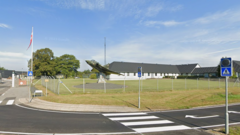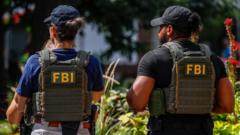What’s Behind the Drones Spotted Over Danish Military Bases?

Published: 2025-09-27 11:10:42 | Category: technology
Recent sightings of drones near military installations in Denmark, including Karup airbase, have raised alarms about national security and potential foreign involvement. This series of incidents, which includes the temporary closure of airspace to commercial traffic, has led to speculations regarding a possible hybrid attack, although officials have yet to provide conclusive evidence linking these events to Russia.
Last updated: 09 October 2023 (BST)
Key Takeaways
- Drones have been sighted above military facilities in Denmark, leading to airspace closures.
- Authorities suspect a hybrid attack but have no evidence linking it to Russia.
- Recent drone incidents have also occurred in Germany, Norway, and Sweden.
- Denmark's Defence Ministry confirms multiple incursions without naming specific installations.
- Concerns about national security and potential foreign aggression are rising among officials.
The Context of Drone Sightings in Denmark
In recent days, Denmark has experienced multiple drone sightings near significant military facilities, particularly Karup airbase, the largest in the country. These incidents have led to heightened national security concerns, especially given the backdrop of escalating tensions between NATO member states and Russia.
The situation escalated on Monday when Copenhagen airport was forced to close for hours due to drone activity. This was followed by similar incidents at Aalborg and Billund airports on Wednesday, which also saw temporary closures. The Danish authorities are now investigating the origin and intent behind these drone incursions.
Understanding Hybrid Attacks
Hybrid attacks are characterised by the use of both military and non-military tactics aimed at disrupting a nation’s infrastructure or institutions. This can include everything from cyberattacks to the deployment of unmanned aerial vehicles (UAVs) that pose a threat to airspace security.
Denmark's Defence Minister has indicated that the recent drone incursions could represent a professional and coordinated effort, possibly launched from within the country, although the specific actors behind it remain unidentified. This ambiguity has left room for speculation regarding potential foreign involvement.
Potential Foreign Involvement and Speculation
While there is no direct evidence tying these drone incursions to Russia, suspicions have been raised based on previous patterns of behaviour attributed to the Kremlin. Russian officials, however, have dismissed these claims, labelling them as “absurd speculations.”
The Russian embassy in Copenhagen has categorically denied any involvement, describing the incidents as "staged provocations." This denial adds to the complexity of the situation, as it reflects the ongoing geopolitical tensions in the region.
The Broader European Context
This wave of drone activity is not unique to Denmark. Reports of suspicious drones have emerged from other countries, including Germany and Sweden, raising alarms about a potential strategy of indirect aggression targeting NATO states that support Ukraine in its ongoing conflict with Russia. Such concerns have been echoed by officials across Europe, particularly following similar incidents in Estonia and Poland, where Russian drones have crossed into airspace.
Estonia and Poland recently requested consultations with NATO members after experiencing incursions, while Romania reported a Russian drone breach. Each of these incidents contributes to an atmosphere of vigilance among NATO allies, who are increasingly aware of the potential for hybrid tactics to disrupt their airspace and national security.
Implications for Danish Security
The Danish government is taking these incursions seriously, as evidenced by the immediate closure of airspace around Karup airbase and the ongoing investigation into the origins of the drones. With approximately 3,500 personnel working at Karup, the base is crucial for Denmark's military operations, making it a strategic target.
Given the recent history of hybrid warfare tactics employed by Russia, Danish authorities are under pressure to enhance security measures and respond effectively to aerial threats. This includes collaboration with military and law enforcement agencies to gather intelligence and ensure the safety of both military and civilian air traffic.
What Happens Next?
The situation remains fluid, with Danish authorities continuing to investigate the drone sightings. While they have confirmed the presence of drones near military installations, the lack of clear evidence linking these activities to foreign actors leaves many questions unanswered.
As investigations progress, it is likely that Denmark will enhance its airspace monitoring and security protocols, not only to deal with the current situation but also to prepare for any future incursions. This proactive approach will be essential in maintaining national security and public confidence in Denmark's ability to safeguard its airspace.
Conclusion
The recent drone sightings near military facilities in Denmark have raised significant security concerns, prompting investigations and airspace closures. While the potential for foreign involvement remains speculative, the rise in such incidents across Europe highlights the need for vigilance in the face of evolving hybrid threats. As Denmark navigates this complex landscape, the implications for national security and NATO's collective defence will continue to be closely monitored.
FAQs
What are hybrid attacks?
Hybrid attacks combine military and non-military tactics to disrupt a nation’s infrastructure or institutions, often blurring the lines between conventional and unconventional warfare.
What has caused the recent drone sightings in Denmark?
The recent drone sightings are suspected to be part of a hybrid attack, potentially linked to broader geopolitical tensions in Europe, although no direct evidence has been established yet.
How have Danish authorities responded to the drone incursions?
Danish authorities have temporarily closed airspace over affected military installations and are conducting investigations in collaboration with military units to determine the source and intent of the drones.
Is there evidence of Russian involvement in the drone activity?
Currently, there is no concrete evidence linking Russia to the drone incursions, although authorities have not ruled out the possibility. The Russian embassy has denied any involvement.
What measures are being taken to enhance national security in Denmark?
Denmark is likely to enhance airspace monitoring and security protocols in response to the drone sightings, focusing on both military and civilian air traffic to mitigate future risks.



